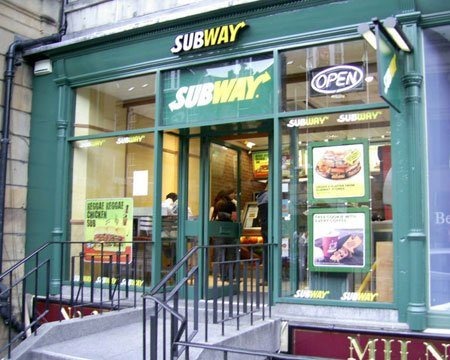Subway's New Eco-Friendly Stores Continue 'Green' Efforts
Subway recently opened five new "eco-restaurants" that are designed to reduce energy, water and waste consumption in cost-effective ways.
The openings bring Milford, Conn.-based Subway's total number of eco-restaurants to 14, out of its approximately 34,000 units. Other locations are also incorporating ecological elements, said Elizabeth Stewart, Subway's marketing director and head of the company's corporate social responsibility efforts.
"Green building is important for all industry," Stewart told Nation's Restaurant News. "We're committed to making our operations as environmentally and socially responsible as possible, down to the store level." Green standards have been formally incorporated into the Subway's business planning since 2007, she said.
The cost "depends on the franchisee and the location they are building," Stewart said. "Some franchisees get into it with all the bells and whistles. Others might not." For example, a solar tube for lighting might be more expensive than another technology.
Franchisee Burhan Ghanayem, a retired environmental health scientist, and his brother Marwan Ghanayem recently opened two eco-restaurants in Cary and Durham, N.C. The U.S. Green Building Council recognized both restaurants with Leadership in Energy and Environmental Design (LEED) certification.
Burhan, who owns a total of 10 Subway units with his brother, said eco-restaurants are educational, with elements like automatic shut-off faucets in the bathrooms.
"I actually learned so much from building my first two eco-restaurants that I want to make my next even greener," he said.
He plans at least two more eco-friendly units.
Many franchisees who cannot rebuild their restaurants are incorporating green elements into their stores, such as low-flow faucets and toilets, energy-saving appliances, motion sensor lights, and recyclable trash cans, Stewart said.
"It's important for us to recognize putting the best business solutions in place. Just because we have a green option, we don't say, 'Go ahead with it,'" she said. "We are really looking for solutions that, first, save money, and second, are cost-neutral. And third is one that has a green element or a sustainability feature, but it requires being in someone's business model for return on investment."
She added, "If someone wants to put in solar panels, we'll help them with that." The company works with advanced technologies on a case-by-case basis, then shares ideas with other franchisees in the system.
Cost savings have been found most rewarding in energy-saving heating and air-conditioning equipment and lighting systems, Stewart said, and Subway has worked with suppliers to improve the energy efficiency of ovens, freezers and refrigerators.
"We're continuing to expand the number of eco stores," she said. "We are continuing to work on our waste stream. Our goal is to pull as much of our waste stream out as possible, not just in our day-to-day operation but also our construction and remodeling waste."
"Because Subway is 100 percent franchised, we're always looking at profitability on the franchisee's side and their bottom line," said Les Winograd, a Subway spokesman. "One of the reasons for doing this is to assist them in being more efficient and more profitable."
Franchisee George Estep recently opened a freestanding drive-thru restaurant in Kokomo, Ind., built entirely from recycled material. Estep's restaurant also includes a large monitor that displays real-time energy use in the restaurant.
Two new units at renovated rest areas off the Merritt Parkway in North Haven, Conn., have incorporated light-harvesting systems through solar panels, high-efficiency air conditioning and plants that do not require any water maintenance.
A soon-to-open Subway at the University of California-Los Angeles' student center will even feature a rooftop terrace and garden.
Customers have reacted favorably to the green units.
"They appreciate learning about the attributes of the location," Stewart said. "Some franchisees have indicated that there are some people that go out of their way to come to their store because they are greener."
— Ron Ruggless
